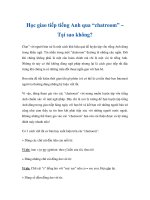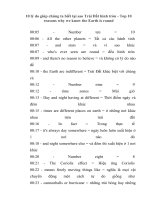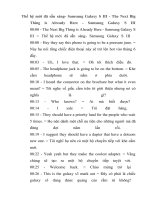Học tiếng anh qua báo Tại sao mỗi lại cắn một số người nhiều hơn những người khác
Bạn đang xem bản rút gọn của tài liệu. Xem và tải ngay bản đầy đủ của tài liệu tại đây (57.6 KB, 5 trang )
Tại sao mỗi lại cắn một số người nhiều hơn những người khác - Why
Do Mosquitoes Bite Some People More Than Others?
You’re not alone. An estimated 20 percent of people, it turns out, are especially
delicious for mosquitoes, and get bit more often on a consistent basis. And while
scientists don’t yet have a cure for the ailment, other than preventing bites with insect
repellent (which, we’ve recently discovered, some mosquitoes can become immune
to over time), they do have a number of ideas regarding why some of us are more
prone to bites than others. Here are some of the factors that could play a role:
Không phải chỉ mình bạn bị vậy đâu. Ước tính có khoảng 20% người giống như bạn,
tức là, đặc biệt thơm ngon hấp dẫn với muỗi, và thường bị muỗi đốt hơn những người
khác. Và trong khi giới nhà khoa học vẫn chưa tìm ra cách chữa trị điều này, ngoại trừ
phòng ngừa muỗi cắn bằng thuốc chống côn trùng (nhưng gần đây chúng ta đã phát
hiện là một số loài muỗi có thể trở nên miễn dịch với thuốc chống côn trùng sau một
thời gian), họ đã đưa ra được một số lý do tại sao một số người trong chúng ta dễ bị
muỗi cắn hơn những người khác.
Blood Type
Nhóm máu
Not surprisingly—since, after all, mosquitoes bite us to harvest proteins from our blood
—research shows that they find certain blood types more appetizing than others. One
study found that in a controlled setting, mosquitoes landed on people with Type O
blood nearly twice as often as those with Type A. People with Type B blood fell
somewhere in the middle of this itchy spectrum. Additionally, based on other genes,
about 85 percent of people secrete a chemical signal through their skin that indicates
which blood type they have, while 15 percent do not, and mosquitoes are also more
attracted to secretors than nonsecretors regardless of which type they are.
Không đáng ngạc nhiên, bởi vì, xét cho cùng, muỗi cắn chúng ta là để lấy các prô-tê-
in trong máu - nghiên cứu cho thấy, đối với muỗi, có một số loại máu ngon miệng hơn
những loại khác. Một nghiên cứu đã phát hiện điều này trong một thí nghiệm có kiểm
soát, muỗi chọn cắn những người có nhóm máu O gần gấp đôi những người nhóm
máu A. Những người có nhóm máu B thì ở mức trung bình của 2 loại máu trên. Ngoài
ra, dựa trên các gen khác, khoảng 85% người có tiết ra một tín hiệu hóa học qua da,
cho biết nhóm máu của họ, trong khi 15% còn lại thì không như vậy, và muỗi cũng bị
hấp dẫn bởi những ai có tiết ra tín hiệu hóa học hơn là những người không, bất kể họ
thuộc nhóm máu nào.
Carbon Dioxide
CO2
One of the key ways mosquitoes locate their targets is by smelling the carbon dioxide
emitted in their breath - they use an organ called a maxillary palp to do this, and can
detect carbon dioxide from as far as 164 feet away. As a result, people who simply
exhale more of the gas over time - generally, larger people - have been shown to
attract more mosquitoes than others. This is one of the reasons why children get bit
less often than adults, on the whole.
Một trong những cách chủ yếu để muỗi định vị mục tiêu của chúng là ngửi mùi CO2
thải ra trong hơi thở của “con mồi” - bằng cách dùng một cơ quan gọi là tua hàm, và
có thể phát hiện được CO2 hiện diện từ cách xa 164 phút. Kết quả là, những ai thở ra
nhiều khí CO2 hơn – thường là những người to lớn – sẽ thu hút muỗi nhiều hơn người
khác. Đây là một trong những lý do tại sao nhìn chung trẻ em ít bị muỗi đốt hơn người
lớn.
Exercise and Metabolism
Tập thể dục và trao đổi chất
In addition to carbon dioxide, mosquitoes find victims at closer range by smelling the
lactic acid, uric acid, ammonia and other substances expelled via their sweat, and are
also attracted to people with higher body temperatures. Because strenuous exercise
increases the buildup of lactic acid and heat in your body, it likely makes you stand
out to the insects. Meanwhile, genetic factors influence the amount of uric acid and
other substances naturally emitted by each person, making some people more easily
found by mosquitos than others.
Ngoài CO2, muỗi tìm kiếm người để chích ở cự ly gần hơn bằng cách đánh hơi các
axit lactic, axit uric, amoniac và các chất khác thải ra qua mồ hôi của họ, và muỗi
cũng thích những người có thân nhiệt cao hơn. Vì tập thể dục vất vả làm tăng sự tích
tụ axit lactic và nhiệt độ trong cơ thể của bạn, có thể khiến bạn hấp dẫn côn trùng.
Đồng thời, yếu tố di truyền ảnh hưởng đến lượng axit uric và các chất khác tiết ra từ
mỗi người một cách tự nhiên, làm cho một số người thu hút muỗi hơn những người
khác.
Skin Bacteria
Vi khuẩn trên da
Other research has suggested that the particular types and volume of bacteria that
naturally live on human skin affect our attractiveness to mosquitoes. In a 2011 study,
scientists found that having large amounts of a few types of bacteria made skin more
appealing to mosquitoes. Surprisingly, though, having lots of bacteria but spread
among a greater diversity of different species of bacteria seemed to make skin less
attractive. This also might be why mosquitoes are especially prone to biting our
ankles and feet—they naturally have more robust bacteria colonies.
Một nghiên cứu khác đã chỉ ra rằng số lượng và một số loại vi khuẩn đặc biệt sống tự
nhiên trên da của con người ảnh hưởng đến sức hấp dẫn muỗi của chúng ta. Trong
cuộc nghiên cứu năm 2011, các nhà khoa học nhận thấy là khi chúng ta có nhiều loại
vi khuẩn nào đó trên da thì ta sẽ thu hút muỗi hơn. Dù vậy, thật lạ là, nếu có nhiều vi
khuẩn nhưng càng thuộc nhiều dạng khác nhau thì dường như càng làm cho da kém
hấp dẫn muỗi. Điều này cũng có thể lý giải tại sao muỗi đặc biệt hay đốt ở mắt cá
chân và bàn chân của chúng ta, vì ở đó thường có nhiều vi khuẩn hơn đáng kể.
Beer
Bia
Just a single 12-ounce bottle of beer can make you more attractive to the insects, one
study found. But even though researchers had suspected this was because drinking
increases the amount of ethanol excreted in sweat, or because it increases body
temperature, neither of these factors were found to correlate with mosquito landings,
making their affinity for drinkers something of a mystery.
Một nghiên cứu đã cho thấy chỉ cần uống 1 chai bia dung tích 12oz (gần bằng 355ml)
cũng khiến bạn thu hút muỗi hơn. Tuy nhiên, các nhà nghiên cứu đã nghi ngờ điều
này bởi vì uống bia làm tăng lượng ethanol bài tiết qua mồ hôi, hoặc làm tăng nhiệt độ
cơ thể, mà cả hai yếu tố này đều được chứng minh là không có tương quan với việc
thu hút muỗi, khiến mối liên hệ giữa việc uống bia & thu hút muỗi khá là bí ẩn.
Pregnancy
Có thai
In several different studies, pregnant women have been found to attract roughly twice
as many mosquito bites as others, likely a result of the fact the unfortunate
confluence of two factors: They exhale about 21 percent more carbon dioxide and are
on average about 1.26 degrees Fahrenheit warmer than others.
Nhiều nghiên cứu khác nhau đều thấy phụ nữ mang thai thu hút muỗi đốt gần gấp đôi
người khác, có thể là hậu quả thực tế của sự kết hợp không may của cả hai yếu tố:
Phụ nữ mang thai thở ra lượng khí CO2 nhiều hơn khoảng 21% và có thân nhiệt cao
hơn khoảng 1.26 độ F so với người thường.
Clothing Color
Màu sắc quần áo
This one might seem absurd, but mosquitoes use vision (along with scent) to locate
humans, so wearing colors that stand out (black, dark blue or red) may make you
easier to find, at least according to James Day, a medical entomologist at the
University of Florida, in commentary he gave to NBC.
Điều này có vẻ vô lý, nhưng muỗi dựa vào thị giác (cùng với mùi hương) để định vị
con người, do đó mặc quần áo có màu sắc nổi bật (đen, xanh hoặc đỏ) có thể làm
cho bạn dễ bị phát hiện hơn, ít nhất là theo những gì James Day, nhà côn trùng học y
học tại Đại học Florida, phát biểu trong bài phỏng vấn với NBC.
Genetics
Di truyền học
As a whole, underlying genetic factors are estimated to account for 85 percent of the
variability between people in their attractiveness to mosquitoes - regardless of
whether it’s expressed through blood type, metabolism, or other factors.
Unfortunately, we don’t (yet) have a way of modifying these genes, but…
Về tổng thể, các yếu tố di truyền bên trong ước tính chiếm 85% trong sự thu hút muỗi
khác nhau giữa mọi người - bất kể nó được thể hiện qua nhóm máu, sự trao đổi chất,
hay các yếu tố khác. Tiếc là chúng ta không hoặc chưa tìm ra cách để điều chỉnh các
gen này, nhưng
Natural Repellants
Những chất chống muỗi tự nhiên
Some researchers have started looking at the reasons why a minority of people seem
to rarely attract mosquitoes in the hopes of creating the next generation of insect
repellants. Using chromatography to isolate the particular chemicals these people
emit, scientists at the UK’s Rothamsted Research lab have found that these natural
repellers tend to excrete a handful of substances that mosquitoes don’t seem to find
appealing. Eventually, incorporating these molecules into advanced bug spray could
make it possible for even a Type O, exercising, pregnant woman in a black shirt to
ward off mosquitoes for good.
Một số nhà nghiên cứu đã bắt đầu tìm hiểu lý do tại sao một số ít người có vẻ hiếm khi
thu hút muỗi với hy vọng tạo ra thế hệ tiếp theo của các chất chống côn trùng. Sử
dụng sắc ký để cô lập các hóa chất đặc biệt mà những người này tiết ra, các nhà
khoa học tại phòng thí nghiệm nghiên cứu Rothamsted của Anh đã phát hiện được là
những người không hấp dẫn muỗi tự nhiên này thường tiết ra một ít các chất mà
dường như muỗi không thích. Cuối cùng, bằng cách đưa những phân tử này vào thuốc
xịt côn trùng thế hệ mới, sẽ có thể khiến muỗi hoàn toàn tránh xa cả những người
máu O, đang chơi thể thao hoặc phụ nữ có thai và mặc quần áo màu đen.









